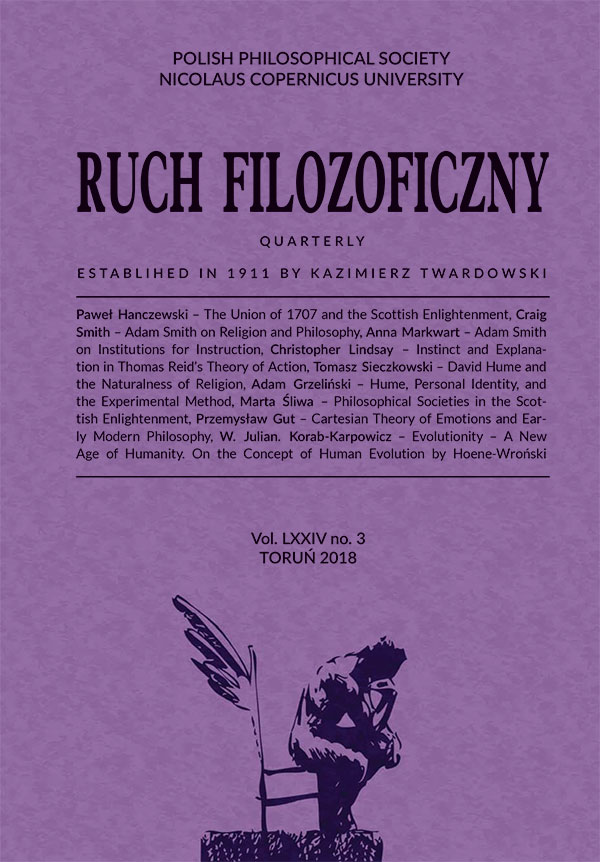Instinct and Explanation in Thomas Reid’s Theory of Action
DOI:
https://doi.org/10.12775/RF.2018.027Słowa kluczowe
Thomas Reid, działanie, ludzka natura, instynkt, wyjaśnienie, filozofia szkockaAbstrakt
Instynkt i wyjaśnienie w Thomasa Reida teorii działania
W swym opisie tego, co nazywa „mechanicznymi zasadami” działania, Thomas Reid rozróżnia działania rozmyślne, wolicjonalne i te, które są wynikiem instynktu bądź nawyku. Twierdzi, że podmiot działający można uznać za odpowiedzialny moralnie jedynie za działania wolicjonalne, gdyż w przyjętym przezeń libertariańskim modelu działania tylko w ich przypadku można mówić o wolności. Niemniej jednak w swych późniejszych pismach Reid wydaje się sugerować, że takie instynktowne działanie jest wcześniejsze w stosunku do działania wolnego, a także je warunkuje. W swym krótkim artykule przedstawiam Reidowską teorię działania, następnie zaś staram się omówić ją tak, aby osłabić krytykę Reida przedstawioną przez Louisa Loeba i innych. Twierdzą oni, że Reid zadowala się takim opisem działania, które odrzuca jakąkolwiek próbę wyjaśnienia przekonań mających swe źródło w ludzkiej naturze. Loeb uznaje, że Hume jako filozof przewyższa Reida z tego względu, że do pewnego stopnia udaje mu się poddać badaniu naukowemu czarną skrzynkę ludzkiego umysłu. Uważam, że Loeb nie ma w tym względzie racji. Chociaż Hume rzeczywiście usiłuje podać psychologiczny opis powstania pewnych przekonań, jest on jednak ułomny ze względu na ograniczenia, jakie Hume narzuca na swój własny system. Opis Reida zawiera odmienne pojęcie wyjaśnienia; jest on bardziej przekonujący, ponieważ nie ogranicza go zbędne podkreślanie roli introspekcji.
Bibliografia
Broadie, Alexander. The Tradition of Scottish Philosophy. Edinburgh: Polygon, 1990.
Copenhaver, Rebecca. “Is Thomas Reid a Mysterian?” Journal of the History of Philosophy 44, no. 3 (January 2006): 449–466.
Ducheyne, Steffen. “Reid's adaptation and radicalization of Newton's natural philosophy,” History of European Ideas 32, (2006): 173–189.
Hampshire, Stuart. Thought and Action. London: Chatto and Windus, 1959.
Harris, James A. Of Liberty and Necessity: The Free Will Debate in Eighteenth-Century British Philosophy. Oxford: Oxford University Press, 2005.
Hume, David. A Treatise of Human Nature. 1739. Edition cited: L.A. Selby-Bigge and P.H. Nidditch (eds.), Oxford: Oxford University Press, 1978.
Laudan, Larry. “Thomas Reid and the Newtonian Turn of British Methodological Thought.” In R.E. Butts and J.W. Davis (eds.), The Methodological Heritage of Newton. Toronto: University of Toronto Press, 1970: 103–131.
Lindsay, Chris. “Hume and Reid on Naturalism, Liberty and Necessity.” In I. Kasavin, (ed.), David Hume and Contemporary Philosophy. Newcastle Upon Tyne: Cambridge Scholars Publishing, 2012.
Loeb, Louis. “The naturalisms of Hume and Reid.” Proceedings and Addresses of the APA 81, no. 2 (November 2007): 65–92.
Maddy, Penelope. “Naturalism and common sense.” Analytic Philosophy 52, no. 1 (2011): 2–34.
McDermid, Douglas. The Rise and Fall of Scottish Common Sense Realism. Oxford: Oxford University Press, 2018.
McMullin, Ernan. “The impact of Newton's Principia on the philosophy of science.” Philosophy of Science 68 (2001): 279–310.
Reid, Thomas. An Inquiry into the Human Mind on the Principles of Common Sense. 1764. Edition cited: D.R. Brookes (ed.), Edinburgh: Edinburgh University Press, 1997.
Reid, Thomas. Essays on the Intellectual Powers of Man. 1785. Edition cited: D. R. Brookes and K. Haakonssen (eds.), Edinburgh: Edinburgh University Press, 2002.
Reid, Thomas. Essays on the Active Powers of Man. 1788. Edition cited: K. Haakonssen and J.A. Harris (eds.), Edinburgh: Edinburgh University Press, 2010.
Reid, Thomas. “Of Power.” Philosophical Quarterly 51, no. 202 (January 2001): 1–12. (Written 1792).
Rowe, William L. “Thomas Reid's Theory of Freedom and Responsibility.” In T. Cuneo and R. van Woudenberg (eds.), The Cambridge Companion to Thomas Reid. Cambridge: Cambridge University Press, 2004.
Van Cleve, James. Problems from Reid. Oxford: Oxford University Press, 2015.
Wolterstorff, Nicholas. Thomas Reid and the Story of Epistemology. Cambridge: Cambridge University Press, 2001.
Wood, Paul. “Thomas Reid and the culture of science.” In T. Cuneo and R. van Woudenberg (eds.), The Cambridge Companion to Thomas Reid. Cambridge: Cambridge University Press, 2004.
Yaffe, Gideon. Manifest Activity: Thomas Reid’s Theory of Action. Oxford: Oxford University Press, 2004.
Pobrania
Opublikowane
Jak cytować
Numer
Dział
Statystyki
Liczba wyświetleń i pobrań: 389
Liczba cytowań: 0



